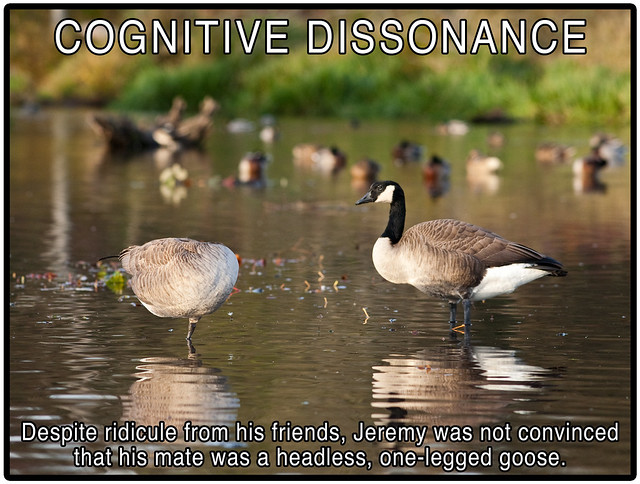 Image Credit: Mark Klotz
Image Credit: Mark Klotz I became interested in this term, cognitive dissonance, when I read an article in Psychology Today that discussed the results of a study that showed parenting does not actually make people happier. Rather, parents simply convince themselves that they are happier/healthier/etc with children, when in fact they are not happier/healthier/etc.
Now, we could have a nice little debate about what criteria they used for “happiness” and the varying experiences that people will have, and that would be fine, but I want to delve a little deeper into what cognitive dissonance really means.
The Church, and its members, are often criticized by this theory of cognitive dissonance. Most recently I heard the term applied to Josh Weed, a gay Mormon man who is in a straight marriage (married to a woman). The comment was from a gay ex-Mormon who said he didn’t really want to read the piece because, “I'm worried that I won't be able to deal with reading about the cognitive dissonance required to be in this guy's head.”
What is Cognitive Dissonance?
It had been a while since I had heard the term used, and so I read a little more about cognitive dissonance. The Wikipedia article about cognitive dissonance says that it is a “discomfort caused by holding conflicting cognitions (e.g., ideas, beliefs, values, emotional reactions) simultaneously.” First of all, this should mean that there wouldn’t have to be cognitive dissonance in Josh Weed’s life, because, to him, the cognitions are not “conflicting”. In fact, who is the judge of what cognitions are conflicting? Wouldn’t that be the person holding the cognitions? So I guess the only determiner of cognitive dissonance would be the person himself. If he is experiencing discomfort, and that discomfort is caused by what he believes to be conflicting cognitions, then that would be cognitive dissonance.
Later in the Wikipedia article we read, “Dissonance is aroused when people are confronted with information that is inconsistent with their beliefs. If the dissonance is not reduced by changing one’s belief, the dissonance can result in misperception or rejection or refutation of the information, seeking support from others who share the beliefs, and attempting to persuade others to restore consonance.”
This is the part that I want to talk about in an analysis of how cognitive dissonance plays a role in our lives as members of the Church.
Cognitive Dissonance for a More Perfect Understanding
Due to what I believe is an incomplete understanding of the gospel, members of the Church, when confronted with information that is inconsistent with our beliefs (i.e., Joseph Smith was sealed to women who were already married, blacks were denied the priesthood until 1978, etc) feel a discomfort, or a dissonance of sorts. I have at times felt that dissonance when confronted by something that I didn’t understand, or something that was inconsistent with my imperfect understanding of the gospel of Jesus Christ.
The Wikipedia article suggests that in such a situation, when there is discomfort and dissonance, there are a few things that may happen to reduce that dissonance:
1) change one’s beliefs
2) misperceive, reject, or refute the information
3) seek support from others who share beliefs
4) attempt to persuade others
And he gave some, apostles; and some, prophets; and some, evangelists; and some, pastors and teachers; For the perfecting of the saints, for the work of the ministry, for the edifying of the body of Christ: Till we all come in the unity of the faith, and of the knowledge of the Son of God, unto a perfect man, unto the measure of the stature of the fulness of Christ: That we henceforth be no more children, tossed to and fro, and carried about with every wind of doctrine, by the sleight of men, and cunning craftiness, whereby they lie in wait to deceive; But speaking the truth in love, may grow up into him in all things, which is the head, even Christ. (Ephesians 4:11-15; emphasis added)
Ironically, the solution I have found to the problem of discomfort when something is inconsistent with my “beliefs” is to change my beliefs. That may sounds as if I am being tossed to and fro by every wind of doctrine, but I was not born knowing everything. I was not born with (nor do I yet possess) a perfect knowledge of the gospel. My faith, my beliefs, have “not grown up to a perfect knowledge.” (see Alma 32:29) It is my goal to feed my faith, and to find the seeds that swell, sprout, and grow – the good seeds. And only after I have found out that it is a good seed will my knowledge be perfect “in that thing” and my faith will be dormant (in that thing). But will my knowledge of all things be perfect? No, I am still growing and learning, by the help of apostles, prophets, evangelists, pastors, and teachers who are helping to perfect me until I come in the unity of the faith. It’s a process.
A more accurate description of this process, rather than describing it as changing my beliefs is, rather, changing my understanding of my beliefs. I claim the beliefs of the Church of Jesus Christ of Latter-day Saints, and more specifically, I claim the beliefs of the gospel of Jesus Christ. Sometimes my understanding of those beliefs is not perfect, and so comes the cognitive dissonance as something is placed in my way that seems inconsistent with “my beliefs”. Rather than being inconsistent with my beliefs, that something is usually inconsistent with my understanding of my beliefs.
In the Wikipedia article about cognitive dissonance it references the cognitive developmental theory of Jean Piaget: “the inevitable conflicts a child experiences between current beliefs and new information will lead to disequilibrium, which in turn motivates the child’s progress through the various stages of development.” As we are all children in the gospel of Jesus Christ, I believe that this dissonance between our understanding of our belief system and what is reality plays a similar role. The disequilibrium that is experienced by us in our journey in gospel learning motivates us through the various stages of development of our testimonies.
Cognitive Dissonance and a Retreat from the World or a Retreat into the World
I pray not that thou shouldest take them out of the world, but that thou shouldest keep them from the evil. They are not of the world, even as I am not of the world. (John 17:15-16)
Going back to the options for resolving cognitive dissonance, I wanted to look at the last three options:
2) misperceive, reject, or refute the information
3) seek support from others who share beliefs
4) attempt to persuade others
Option #2 happens all the time in the Church. This is the one where people say “Oh, there’s no way Joseph Smith had all those wives.” “The Church would never do ___.” “Joseph Smith never married women who were already married, that’s just a story some anti-Mormon made up to discredit him.” These are examples of rejecting, misperceiving, or refuting information that sounds inconsistent with one’s beliefs.
Option #3 happens just as frequently. This is where members who don’t believe that unsavory things ever happened in the Church stick together and stay away from all the “heretics” who accept that there are unsavory aspects about every person and every organization. (Let me add here that unsavory aspects of our character make us human, not evil).
Option #4 is a little more subtle. I think this method of decreasing cognitive dissonance is found when members of the Church criticize those who are asking questions with the intent of gaining a better understanding of their beliefs (option #1). Members who are using option #4 will claim those using option #1 to gain a deeper understanding of their beliefs are headed down a “slippery slope”. There are those who will, in using option #1, rather than coming to a better understanding of their beliefs will abandon their misunderstood beliefs altogether, in effect becoming apostate, but not all members who ask questions in the face of cognitive dissonance are on slippery territory.
I frequently question my understanding of a belief, for example, the doctrine of gender identity is a doctrine I struggle with immensely – due to cognitive dissonance. However, I take the approach of “true until proven false” with gospel teachings, and what I usually find is that my understanding may be proven false, but the truth, or the doctrine, stands firm. It is a kind of refiners fire, where my imperfect, human perspective and understanding is burned off through these “hard” questions until only the pure doctrine remains.
Cognitive Dissonance – Hard Things and Joy
Going back to the article about parental love being merely cognitive dissonance takes me back to option #1 – changing our beliefs, or rather, having a more clear understanding of our beliefs.
The article may seem to contradict what the prophets have taught us – that families are important and that families bring us joy.
The truth of the matter is, things that bring us the greatest joy are often the hardest things to do. Ask anyone who has run a marathon, or climbed Mt. Everest, or walked again after a stroke. They won’t beat around the bush and say, “Oh yeah, those 26.2 miles, they were awesome!” or “My favorite part was the last mile to the peak. It was cake! I practically sailed up that mountain!” or “My legs felt light as feathers! I just stood up and I could walk!” More likely you will hear, “When I crossed that finish line felt like I had done something really amazing!” or “The view from the peak was breathtaking. Totally worth the climb!” or “Running in the yard with my grandkids again made me feel like a million bucks!”
When presented with the less pleasant, physically and emotionally draining, costly tasks associated with raising parents, this may seems to be inconsistent with our belief that children and families bring us joy.
The answer isn’t to refute the claims that parenting is hard (it is), or hang out more with other people who think parenting is all roses and candy (it isn’t), or attempt to convince other people that parenting really is fun all the time (it definitely isn’t) we can just deepen our understand of what joy really means.
Joy is s a feeling that we experience intermittently in parenting (when we see our children becoming kind, independent, functional human beings), and also in our gospel lives (when we have a glimpse of God in our lives). It’s that feeling you get at the finish line where you just know that you have done something really amazing.
How has cognitive dissonance played a role in the formation (or destruction) of your testimony? How do you respond to cognitive dissonance?








 Image Credit:
Image Credit:  that I carried around with me a lot as a teenager and young adult, for quick reference to gospel topics. I used it in talks, lessons, and gospel discussions with friends.
that I carried around with me a lot as a teenager and young adult, for quick reference to gospel topics. I used it in talks, lessons, and gospel discussions with friends.


 I mentioned before that I participated in TwitterStake this year for
I mentioned before that I participated in TwitterStake this year for 



